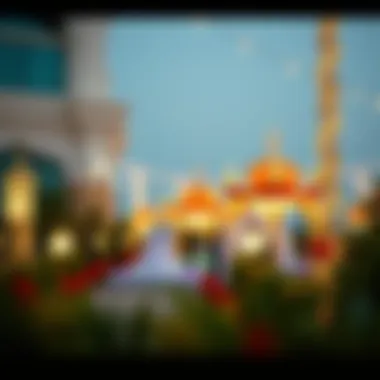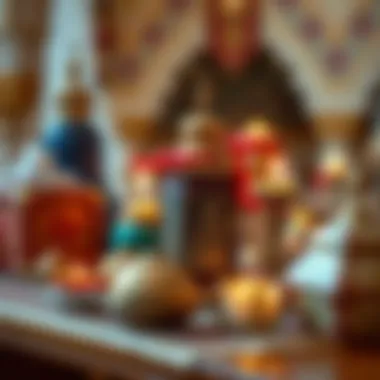Eid Holidays in the UAE: Cultural and Economic Insights


Intro
The UAE Eid holidays present a unique blend of cultural vibrancy and economic opportunity. As one of the most anticipated festivals throughout the region, Eid not only encourages a sense of community and shared tradition but also catalyzes increased activity in various sectors such as tourism, hospitality, and real estate. During this period, Muslims worldwide come together for prayer and celebration, and the UAE, particularly cities like Dubai, plays host to spectacular activities, drawing visitors from near and far.
Travelers, investors, and even locals eagerly anticipate this time of year, making strategic decisions based on holiday trends and consumer behaviors. The implications of these festivities stretch beyond personal enjoyment; they resonate through the marketplace, significantly affecting real estate dynamics and investment landscapes. For stakeholders keen on influencing or understanding market movements, recognizing the nuances of the Eid holidays is not simply advantageous; it is essential.
As we dive deeper into this exploration, we will dissect various elements ranging from the practical aspects of travel plans to the intricacies of property investments during this festive season. Let’s get started by looking into the current market trends influenced by the Eid holidays.
Cultural Significance of Eid in the UAE
The Eid holidays in the UAE hold a profound importance, reflecting a blend of cultural, religious, and social values shaping the society. Understanding this significance can offer valuable insights to investors, buyers, and other stakeholders by illuminating the societal fabric that underscores the vibrant UAE lifestyle.
Historical Context
Eid celebrations trace their roots back to the early days of Islam and resonate with the very essence of the religion itself. Eid Al-Fitr marks the end of Ramadan, a month devoted to fasting, prayer, and reflection, while Eid Al-Adha commemorates the willingness of Ibrahim to sacrifice his son as an act of obedience to God. In the UAE, these holidays are not just religious observances but also a means of connecting with one’s heritage. The history of Eid has evolved over decades, reflecting the changing dynamics of the society. It stands as a testament to the UAE's blend of tradition with modernity, allowing for a richer cultural experience. The celebrations honor not just the act of faith, but also a rich history that binds the people together.
Religious Observances
At the heart of Eid lies a deep-seated religiosity. The prayers at mosques, led by local imams, are a communal affair, drawing crowds from all corners of the nation. On Eid Al-Fitr, after the special prayers, it is customary to give Zakat Al-Fitr, a form of charity intended to purify those who fast from any indecent act or speech before Eid prayers. Eid Al-Adha includes rituals such as the sacrifice of an animal, where a portion of the meat is donated to the less fortunate, reinforcing the concepts of charity and community. These practices are more than just traditions; they serve as reminders of empathy and social responsibility that are pivotal in maintaining harmony within the diverse society of the UAE.
Social Traditions during Eid
Socially, Eid brings families and friends together, fostering bonds that may be overlooked in daily life. Feasting is a central theme, where tables are adorned with an array of dishes reflecting both local and international cuisines. For instance, dishes like harees, maamoul, and kebabs are staples during these festive times, showcasing the culinary fusion characteristic of the UAE.
In addition, it is common for people to exchange gifts, ranging from cash to toys, especially for children. This practice not only brings joy but also symbolizes love and respect among families and friends. Furthermore, community gatherings, whether large-scale events or intimate family reunions, play a key role in strengthening social ties. Open houses and lavish meals signal a time of sharing and connection, creating lasting memories.
Ultimately, the cultural significance of Eid in the UAE transcends mere festivities. It provides a lens through which the intricacies of social values, economic behaviors, and cultural nuances can be understood. For investors and stakeholders, recognizing these traditions can lead to informed strategies that align with the local culture.
"Eid is not just a day of festivity; it is a celebration of the everlasting bonds that unite friends and family, making it a cornerstone of social life in the UAE."
Understanding these elements can help navigate not just the festive seasons but the fabric of the UAE’s dynamic society.
Eid Holidays Calendar
The calendar of Eid holidays holds particular significance in the UAE, acting as a cornerstone for numerous cultural and economic activities. Understanding the dates and duration of these holidays is not just about marking a calendar; it’s about grasping the pulse of a society that thrives on tradition as well as modernity. For investors, buyers, and property managers alike, recognizing the ebb and flow of this holiday season can uncover opportunities and strategic advantages within the bustling landscape of Dubai.
Eid Al-Fitr and Eid Al-Adha
Eid Al-Fitr
Eid Al-Fitr, which marks the end of Ramadan, is a festive occasion particularly adored across the UAE. It celebrates the conclusion of a month filled with fasting, reflection, and communal prayers. The day is often a time for grand feasts, where families gather to share meals that are far from ordinary. It is not uncommon to see tables spread with sumptuous dishes, from biryani to gleaming sweets like kunafa.


Why it matters: For businesses, particularly in the hospitality and retail sectors, Eid Al-Fitr signals an uptick in sales—a sweet spot for marketers targeting families eager to celebrate. The vibrant atmosphere draws substantial foot traffic to malls and local eateries, making it an optimal time for promotional events.
Eid Al-Adha
Eid Al-Adha, known as the
Travel and Leisure during Eid
Eid holidays are a time when family bonds strengthen and communities come together, but they also present a unique opportunity for travel and leisure within the UAE. With the holiday spirit in the air, many people set off to explore beautiful local destinations or even venture abroad. Understanding the dynamics of travel during Eid can be beneficial not just for leisure enthusiasts but also for investors and businesses aiming to capitalize on this vibrant period. The festive season sees people keen to escape their daily grind, and this rise in travel directly influences various sectors, most notably hospitality and tourism.
Increased Domestic Travel
During the Eid holidays, there is a notable uptick in domestic travel, as locals choose to explore their own backyard rather than go overseas. This phenomenon is driven by several factors:
- Family Gatherings: Many individuals prefer to gather with family and friends, making short trips to nearby cities or resorts immensely popular.
- Convenience: Domestic travel offers ease of planning and less hassle compared to international trips, where visas and flight bookings can be tedious.
- Economic Considerations: Often, traveling within the UAE can be more cost-effective, especially in terms of accommodation and transportation.
Cities like Abu Dhabi, Fujairah, and Al Ain become hotspots, hosting festivals and events that celebrate the cultural richness of Eid. The bustling activity during this time breathes life into local economies, as retail shops and leisure venues prepare for an influx of visitors looking for festive atmospheres and unique experiences.
Popular Destinations within the UAE
The UAE boasts numerous captivating destinations, each offering its own experience tailored for Eid celebrations:
- Dubai: With attractions like The Dubai Mall and extravagant fireworks at the Burj Khalifa, Dubai appears to be a favored choice. Families flock here for shopping sprees and to indulge in world-class dining options.
- Abu Dhabi: Visit the Sheikh Zayed Grand Mosque or explore the Louvre Abu Dhabi. The capital gives visitors a taste of both culture and luxury during Eid.
- Ras Al Khaimah: Known for its stunning beaches and mountain scenery, Ras Al Khaimah attracts those looking for a mix of relaxation and adventure, such as ziplining across the Hajar Mountains.
- Fujairah: Ideal for those who favor a slower pace, Fujairah’s beautiful coastline and historical sites make it a serene destination for Eid getaways.
Each of these spots tends to devise unique promotions and programs, creating a festive environment that draws crowds, thereby boosting the tourism sector.
International Travel Trends
Eid holidays don’t just stir domestic trips but also fuel international travel. As local residents seek to spend their time off, many look further afield to international destinations. The following aspects highlight the trends:
- Popular Destinations: Countries like Turkey, Malaysia, and the Maldives see a significant rise in Emirati tourists during Eid, drawn by appealing holiday packages and exotic experiences.
- Airline Promotions: Airlines frequently roll out special fares and packages tailored for Eid, thus making international travel more attainable.
- Cultural Exchange: Many travelers use this holiday as an opportunity to explore new cultures, food, and traditions, reinforcing cultural exchange and friendships across borders.
Economic Impact of Eid Holidays
The economic impact of the Eid holidays in the UAE is a subject that resonates on multiple levels. Each year, these celebrations not only bring people together in joyous observance but also catalyze significant financial activity across various sectors. This section will delve into some of the most notable impacts, centered around retail sales, hospitality, and the real estate market, shedding light on how these elements intertwine with Dubai's vibrant economic fabric.
Boost in Retail Sales
Eid marks a peak time for retail, often seen as the "Black Friday" of the Arab world. Both consumers and businesses anticipate this time of year to hit their respective financial goals. During these holidays, shoppers indulge in purchasing gifts, clothing, and household items, leading to a noticeable uptick in retail sales.
- Sales Surge: Traditionally, shops and malls offer discounts and promotions tailored specifically for Eid, drawing in large crowds. Popular brands, ranging from local boutiques to international retailers, see increased foot traffic. For instance, Mall of the Emirates and Dubai Mall transform into bustling hubs of activity, thrumming with excitement.
- Consumer Behavior: Shopping patterns typically shift as consumers, eager to prepare for festive gatherings, prioritize their spending on luxury items and gifts. As families come together, the expenditure on food and entertainment swells, creating a perfect storm for retail growth. Eid gifts, such as electronics and fashion, flood the markets, and it’s common for retailers to plan inventory well in advance to meet this expected demand.
Hospitality Sector Growth


Eid holidays serve as a boon for the hospitality sector, where hotel bookings and restaurant reservations see a dramatic spike. In Dubai, known for its luxury accommodations and diverse eateries, the influx of both local and international tourists contributes significantly to the economy.
- Accommodation Boom: Hotels often cater special packages during Eid, attracting not just tourists, but also residents looking for a short staycation. This trend leads to full occupancy rates, often exceeding those during other holiday seasons. The likes of Jumeirah Beach Hotel and Atlantis The Palm typically report substantial increases in bookings.
- Dining Experiences: Restaurants also prepare for a flurry of activity. Eid is associated with feasting and communal meals, and eateries serve special menus featuring traditional dishes. Reservation systems often become saturated weeks in advance as families and friends plan to dine out together.
Real Estate Market Effects
While less immediate, the impact of Eid on the real estate market is notable in the longer term. The celebratory atmosphere and increased financial activity create a riding wave of confidence among investors and buyers. This upsurge often reflects in both residential and commercial property investments.
- Increased Rental Demand: Given that many expatriates prefer to celebrate Eid in the UAE, the demand for short-term rentals often sees an increase. Property owners capitalize on this opportunity during the holidays to maximize rental income.
- Investment Confidence: As people enjoy the festive spirit, it also translates to a general optimism in the economy. Investors may feel more inclined to make significant financial decisions, influenced by the overall economic vibrancy around Eid. This can lead to more activity in property sales, particularly in emerging developments like Dubai Creek Harbour.
"The economic implications of Eid holidays reach beyond mere festivity; they foster a pulse of growth and opportunity for various sectors in the UAE."
Overall, the commercial landscape during Eid is a tapestry of celebratory colors that symbolizes much more than cultural observance; it is a representation of the potential for economic vigor observed through various sectors responding to the rhythms of life in the UAE.
Traditions and Customs
Understanding the Traditions and Customs surrounding Eid in the UAE unveils a rich tapestry of cultural practices that bind communities together. These traditions serve not only as a means to honor the significance of Eid but also reflect the unique identity of Emirati society. The emphasis on specific customs reveals the intertwined relationship between daily life and the values that uphold the community.
Feasting as a Central Theme
At the heart of Eid celebrations is feasting, a tradition that transcends mere consumption; it encapsulates joy, generosity, and gratitude. Families gather to prepare an array of traditional dishes that symbolize richness and togetherness. Meals often include delights such as margaret, kebabs, and sweet treats like maamoul, which are often filled with dates or nuts.
Eid Al-Fitr, marking the end of Ramadan, is particularly notable for these gatherings, as families come together to break their month-long fast. In many households, the preparation of food is seen as an act of love, and sharing these meals with friends and neighbors strengthens community ties. Food is often shared generously, reminding everyone of the importance of benevolence, a core value in Emirati culture.
Gift-Giving Practices
Another pivotal aspect of Eid celebrations in the UAE is gift-giving. This practice extends beyond family to friends and even acquaintances, emphasizing social bonds and goodwill. Traditionally, Eidiya, which are gifts or money given to children, symbolize blessings for the new year ahead.
Moreover, the act of gifting is not just limited to material objects; acts of kindness, such as cooking meals for those in need, are common. Such gestures reinforce the spirit of community and charity during the holiday. In a way, gifts serve as a reminder of one's social obligations and the importance of maintaining connections.
Community Gatherings and Events
Eid is also an opportunity for community gatherings, bringing people together in celebration. Cities across the UAE come alive with a multitude of events, from fairs and concerts to prayer services and cultural exhibitions. During this time, local parks and public spaces become communal hubs, filled with laughter and joy.
These events often include traditional performances, cultural displays, and interactive activities for children and families, making Eid a vibrant celebration for all ages. It's during these gatherings that the spirit of unity shines most brightly, as people from diverse backgrounds come together to celebrate a shared culture while respecting each other's traditions.
"Eid Mubarak is not just a greeting; it embodies the spirit of generosity and compassion we hold dear as a community."
Overall, the Traditions and Customs of Eid in the UAE hold immense significance. They offer glimpses into the values of the society and foster connections that last far beyond the festivities. Understanding these practices can enable investors and developers to appreciate the rhythm of life in the UAE and the integral role that cultural celebrations play in the economic landscape.
Impact on Lifestyle in Dubai


The impact of Eid holidays on lifestyle in Dubai is more than just a series of days off; it's a transformation of how residents experience their daily lives. During Eid, a palpable shift occurs in everything from work schedules to social interactions. The change is most acutely felt in the bustling rhythm of day-to-day activities, where the essence of community and tradition intertwines with modern conveniences.
Shift in Daily Routines
As Eid approaches, the atmosphere in Dubai morphs. People tend to adjust their work schedules to accommodate heightened family interactions and celebrations. Office timings can shift, with many businesses offering flexible hours to allow employees to observe the festivities. Residents might find themselves exchanging the usual hustle for a slower pace, embracing communal breakfast rituals or festive lunches that stretch deeper into the day.
This time is marked by a sense of community – neighbors become like family, visiting each other's homes, sharing meals, and exchanging pleasantries. The focus on family gatherings often leads to a noticeable decrease in formal engagements. Moreover, personal errands and routine tasks might be postponed, as individuals prioritize family connections over standard routines. It’s a delightful break from the grind, bringing a refreshing change to the city's speed.
Eid Sales and Promotions
The commercial landscape in Dubai experiences a boost during Eid, thanks to sales and promotions that attract shoppers. Retailers seize this opportunity to capitalize on the festive spirit, offering discounts on everything from luxury goods to electronics. Shopping malls and markets prepare for a surge in foot traffic, and many residents set aside budgets specifically for Eid purchases.
- The shopping season tends to kick off weeks before the actual holidays, allowing ample time for residents to indulge in retail therapy.
- Local fashion designers craft special collections that reflect the holiday spirit, while established brands roll out limited-edition products to entice buyers.
- Additionally, hospitality venues create enticing packages and experiences to attract families eager to celebrate together.
This boosts not just retail, but the hospitality sector, contributing significantly to Dubai’s economy. Shoppers can expect a vibrant atmosphere in malls filled with special displays, culturally themed decorations, and a palpable sense of excitement.
Cultural Exchange and Diversity
Eid exemplifies the melting pot of cultures that defines Dubai. Residents come from every corner of the globe, and during this festive period, the celebration becomes a platform for cultural exchange. Emiratis and expatriates alike participate in traditions that might be unfamiliar to some, enriching their understanding and appreciation of diverse cultural practices.
- Various exhibitions showcasing traditional music, dance, and food take place, allowing everyone to immerse themselves in a blend of old and new.
- It offers insights into local customs, deepening the appreciation for Emirati culture and history.
- The inclusive atmosphere encourages people to attend neighborhood gatherings where traditional dishes like biryani and kabsa are served, allowing hearts to open and friendships to form.
Eid in Dubai is thus not only a time of celebration but a reminder of the city’s commitment to diversity and community, acting as a bridge that connects various cultures while fostering mutual respect and camaraderie.
Overall, the lifestyle changes brought upon by Eid holidays underline the importance of family, shopping, and community cohesion in the vibrant life of Dubai.
These various impacts highlight how Eid is more than a religious observance in Dubai; it’s a unique blend of tradition and modernity that shapes the community's lifestyle and offers deeper insights for investors and business managers looking to navigate the complex social landscapes in this dynamic environment.
Culmination
Eid holidays within the UAE stand as a vibrant tapestry woven from threads of tradition, community, and economic vitality. Recognizing the importance of these celebrations isn’t just about observing cultural practices; it encapsulates a broader understanding of how the UAE seamlessly blends its rich heritage with modern living. The significance of Eid transcends mere festivities; it fosters unity among diverse communities, nurturing feelings of empathy and benevolence. As investors, buyers, and stakeholders, understanding the intricacies of these holidays can reveal insights into consumer behavior, property demand, and even tourism trends.
Reflections on Eid's Role in the Community
Eid serves as a catalyst for community bonding. The essence of these celebrations is about coming together, sharing meals, and engaging in communal activities. Families often host large gatherings, where traditional dishes are prepared and enjoyed together. These reflections showcase how Eid goes beyond personal festivities—it strengthens social ties. As observed in many neighborhoods, local organizations hold events that attract people from varied backgrounds, thus preserving and promoting cultural exchange.
Moreover, participation in community service during Eid, often encouraged through initiatives like Zakat (charitable giving), reflects a societal commitment to uplift one another. It’s a time when many feel moved to lend a helping hand, distributing food or clothing to the less fortunate. These practices not only uplift the community but also serve as a reminder of shared humanity.
Future Prospects of Eid Celebrations in the UAE
Looking ahead, the future of Eid celebrations in the UAE appears promising and ever-evolving. As the nation continues to develop, the integration of modern practices with traditional celebrations will offer unique opportunities for engagement. For investors and developers, understanding future trends of Eid can provide critical insights into economic forecasting.
The demand for holiday experiences that cater to both locals and tourists is expected to grow, leading to more pedestrian-friendly festivals and community-focused events. There may be increased collaborations with businesses that specialize in offering tailored experiences during Eid, from luxurious dining to family-friendly entertainment offerings.
In the context of real estate, properties that cater to communal gatherings or are close to festive locations might find a surge in desirability as Eid traditions become increasingly blended with modern lifestyle preferences.
As such, monitoring developments in how Eid is celebrated—particularly regarding digital trends and global influences—will be crucial for stakeholders in the UAE. Understanding these cultural shifts will enable key players to anticipate and respond to emerging market demands effectively.
In summary, Eid’s role is not static; it will continue to evolve alongside the UAE's unique landscape of cultural diversity and economic growth, presenting opportunities for those keen to invest in a festive future.



